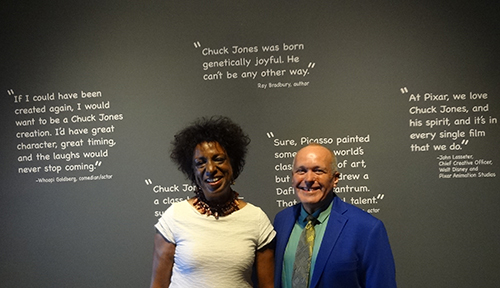The Man Behind the Looney Tunes
How Bugs and Daffy came to life.
By
Will Friedwald
July 18, 2014 6:05 p.m. ET
'Duck Amuck' (1953) is a benchmark of American film comedy Chuck Jones Center for Creativity/TM Warner Bros.
Queens, N.Y.
By 1953, nearly every Hollywood cartoon seemed to be about conflict: Somebody was always chasing or hunting somebody else. But in Chuck Jones's remarkable "Duck Amuck," the confrontation was between Daffy Duck and the off-screen animator who controlled his pen-and-ink destiny. The brief, seven-minute piece continually broke through the cinematic "fourth wall" in a way no live-action film ever could, but at the time that was hardly a new idea: Cartoon characters had been directly addressing movie audiences for years. What made "Duck Amuck" a classic was the degree to which Daffy—as directed by Jones, animated by Ken Harris and voiced by Mel Blanc—becomes such a believable character. No matter how many times his image is erased and redrawn, Daffy remains completely three-dimensional in a two-dimensional medium as he goes on an emotional journey through confusion, anger and, ultimately, resignation, in which he constantly bickers and bargains with his creator. Every aspect of the film reminds us that Daffy is just a drawing, and yet, over the past 60 years, Daffy has become no less real to us than Clark Gable or Humphrey Bogart. With a less-believable star, the conceit of character vs. animator could have been a big snooze; instead, with this "despicable" fall guy of a leading man placed in the accomplished hands of Jones and company, "Duck Amuck" became a masterpiece of American film comedy.
What's Up, Doc?
The Animation Art
Of Chuck Jones
Museum of the Moving Image
Through Jan. 19
Charles M. Jones (1912-2002) was, in fact, easily one of the greatest comedy directors in the history of motion pictures, indisputably on a par with Preston Sturges, Billy Wilder, Mel Brooks or Woody Allen. Jones's role in the history of animation and film comedy is explored in a new exhibit, "What's Up, Doc? The Animation Art of Chuck Jones," which opened Saturday at the Museum of the Moving Image. The exhibition, a co-production of the Smithsonian, the Academy of Motion Picture Arts and Sciences, the Chuck Jones Center for Creativity, and MoMI, will close in January and then tour the country through 2019. It includes more than 125 pieces of production artwork on display and 23 of Jones's cartoons, some screened in two different film shows and others as part of the exhibit itself.
Even though Jones would never be as famous as the characters he directed or helped create—Bugs Bunny, Porky Pig, Elmer Fudd, the Road Runner and Coyote, and Pepe Le Pew, among others—he came closer than any animated filmmaker (after Walt Disney) to attaining the name-above-the-title status of a Frank Capra, Alfred Hitchcock or Martin Scorsese. In 1996, the Motion Picture Academy presented Jones with an Honorary Academy Award—a lifetime-achievement award to add to the three Oscars he already won for best short.
In a sense, Jones is an even more distinctive stylist than any Hollywood feature director; you can quickly identify his work from just a single frame, the same way you can immediately distinguish between comic strips by George Harriman and Al Capp. Jones's earliest directorial efforts, particularly those starring the talkative, rather phlegmatic mouse named "Sniffles," show an ability to create a naturalistic, believable character—but little else. By World War II, however, Jones was in step with the rest of the studio in placing his characters in situations that were fast and funny.
Like Duke Ellington and Frank Sinatra, Jones was a visionary who brought a touch of the avant-garde to the mainstream—he encouraged his animators and designers to push the limits of the animated medium and do things that had never been done before, with faster, razor-sharp timing and a bolder, more innovative look. He was miraculously subtle: "Cartoon" implies the broadest possible action and situations, but Jones's work was all about the tiniest of nuances. It isn't just that Wile E. Coyote falls off a cliff in his Acme-aided efforts to catch the Road Runner—it's the tiny, almost unnoticeable puff of smoke that appears at the bottom of the canyon that seals the deal.
Throughout the 1950s, Jones turned out classics with astonishing regularity, making the now-established Looney Tunes formulas work better than anyone else could by continually turning them on their head: "One Froggy Evening" (1955) pivots around a frog who miraculously sings and dances; "What's Opera, Doc?" (1957) overlays two sets of myths on top of each other: the pantheon of Norse-Germanic deities (as codified by Richard Wagner in his "Ring" cycle) and the equally well-known and oft-told rabbit-hunting framework (as codified by Tex Avery in the 1940 "A Wild Hare"). Thus Elmer in a viking helmet chases Bugs, who is disguised in drag as Wagner's metal-bosomed Valkyrie Brünnhilde. When Elmer finally "kills the wabbit," he is overcome with remorse and begins toting the lifeless carcass to Valhalla in a climax of "wabbiterdamewung."
(Oddly, "Duck Amuck," "One Froggy Evening" and "What's Opera, Doc?" aren't among Jones's Oscar-winning efforts.)
It was, indeed, a twilight of the gods in the Hollywood studio system as the regime—for both live and animated film—was already being dismantled. Yet Jones went on to do some of his best work in the years that followed, including the two best adaptations of Dr. Seuss stories: "How the Grinch Stole Christmas" (1966) and "Horton Hears a Who" (1970). He lived to be an elder statesman, with a broad range of stylistic descendants not only in animation (the climactic scene in "Monsters, Inc." is an homage to Jones's 1952 "Feed the Kitty"), but live-action feature films, television, theater and even music. Jones said over and over—to me and anyone else who ever knew him—that his characters embodied different aspects of himself: Bugs was the suave, cool customer he aspired to be, but Daffy more accurately embodied his real-life frustrations while the Coyote represented his perceived ineptitude with tools. In laying out his own foibles for the whole world to laugh at, Jones touched us in a way that other directors could only dream about.
Mr. Friedwald writes the weekly Jazz Scene column for the Journal.





